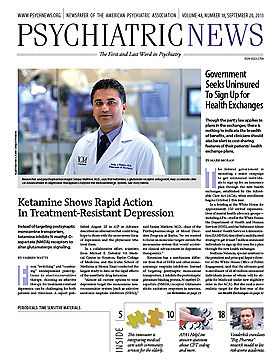As I turned the pages of the June 21 issue of Psychiatric News and reached page 13, my eyes jumped to the headline, “Psychiatrists Have Role in Assessing Candidates for Asylum.” My heart raced, my spirits soared, and my admiration for our Association and its newspaper ascended. Asylum was a longstanding interest of mine (Geller JL, Morrissey JP: Asylum within and without asylums. Psychiatric Services 55:1128-1130, 2004) and here was APA suggesting psychiatrists play significant roles in determining who in America needs asylum.
As I read the article, my mood dropped as if I was in rapid-cycling bipolarity. This was not an article about asylum for those in the United States with serious mental illness uncared for, untreated, perhaps untreatable, and dangerous, such as persons with serious mental illness and fire-setting, traumatic brain injuries, pedophilia, major neurocognitive impairments from chronic alcohol misuse, and others. No, this was about political asylum.
Despite kicking myself for my naivete and abject misplaced optimism, I read on. I found that the cohort of persons with severe mental illness mentioned above might well qualify for “political asylum.” According to the article, “Under the Convention Against Torture, an individual must establish that it is ‘more likely than not’ that he or she would be tortured if forced to return to the proposed country of removal. Torture is defined as intentional acts that cause severe mental or physical pain.” Seems to me that all we have to do is replace “country” with “county” and that perfectly fits the population of concern.
If we can evaluate persons from other countries who need “asylum,” isn’t it time we return to evaluating Americans with serious mental illness and comorbid conditions rendering them persistently dangerous to others, or even themselves, who need “asylum”?
And of course, once identified, then we need to actually provide “asylum.” For some this would be in an asylum; for others this could be done through wraparound asylums, well known as WAA’s.
JEFFREY GELLER, M.D.Worcester, Mass.Dr. Geller is APA’s Area 1 trustee.
Response from Howard Zonana, M.D., a member of APA’s Committee on Judicial Action and a corresponding member of APA’s Council on Psychiatry and Law. Dr. Zonana was quoted in the article to which Dr. Geller refers
Yes, there are major problems with the U.S. system of mental health care—inadequate numbers of hospital beds, lack of access to care for many uninsured, and much more, although we no longer use the term “mental asylum.” But I would contend that these problems should not make us withdraw from treating and evaluating those in need, whether or not they are U.S. citizens. The community mental health center where I work evaluates and treats individuals without demanding proof of citizenship, as I believe it should. I also think that working with attorneys who are providing services pro bono in aiding deserving asylum applicants is the kind of activity we should be encouraging in our residency programs.
There are many conceivable responses to working with individuals who are seeking asylum in the United States because of well-founded fears of persecution on account of race, religion, nationality, political opinion, or membership in a particular social group as recognized by U.S. law and policy. It is our mission as psychiatrists to work toward creating a world where all those who need psychiatric care have access to it. ■
